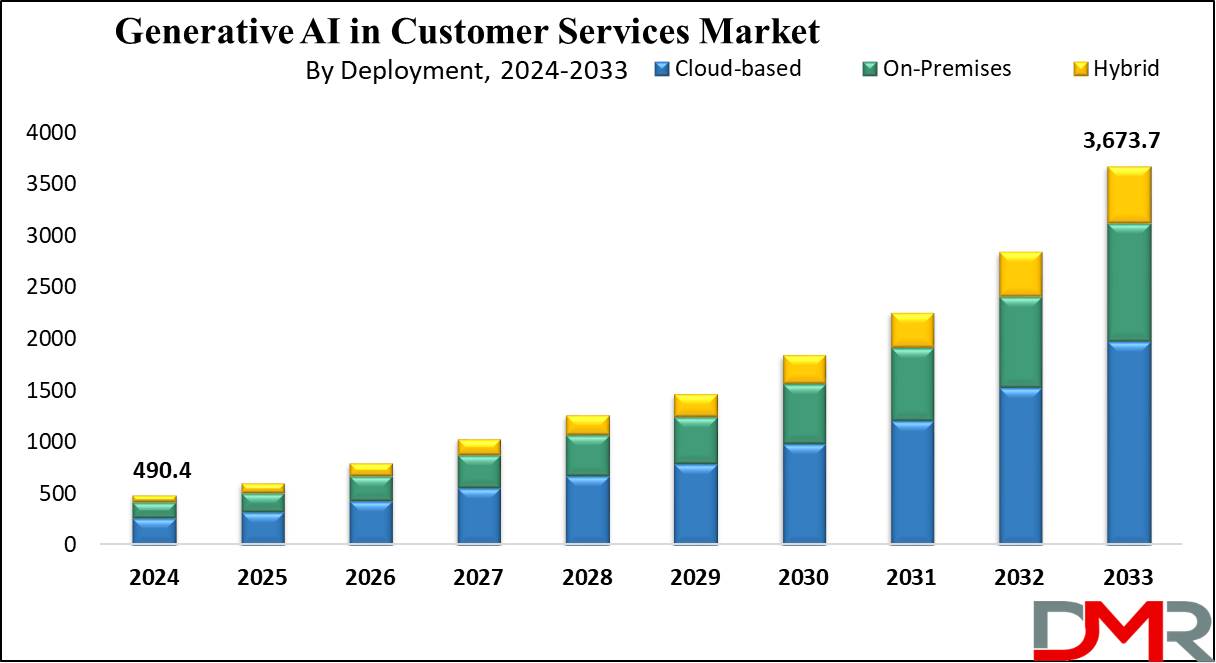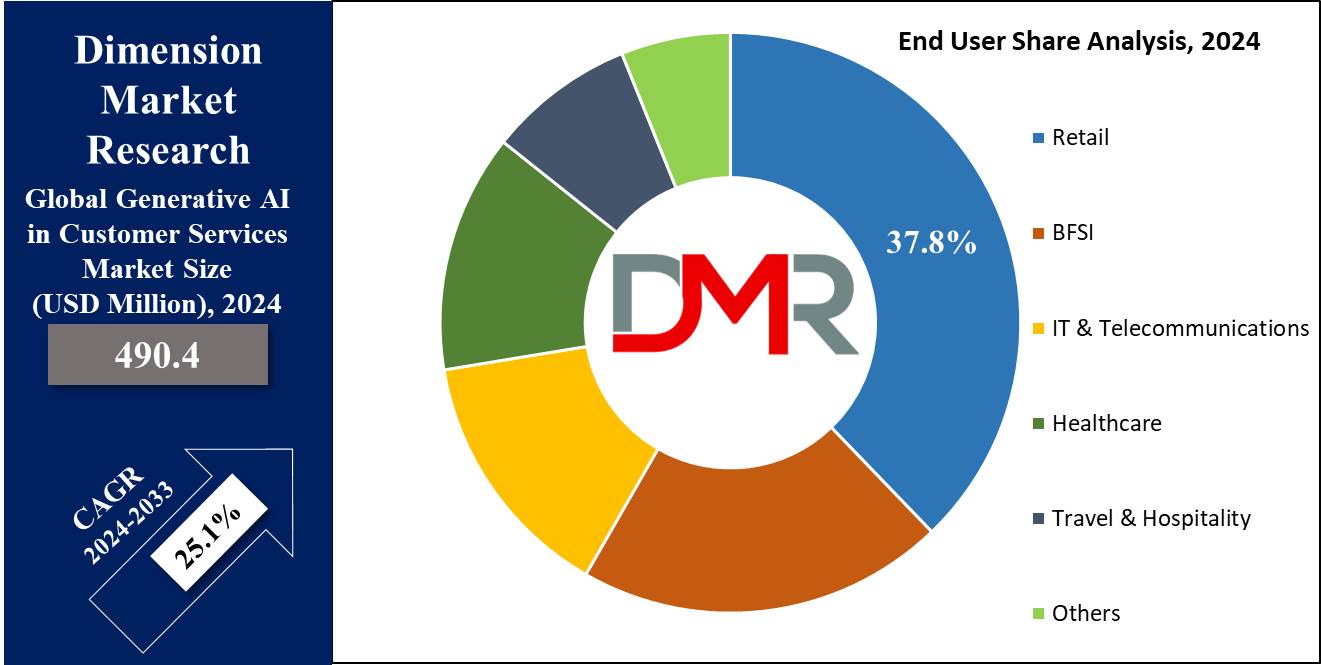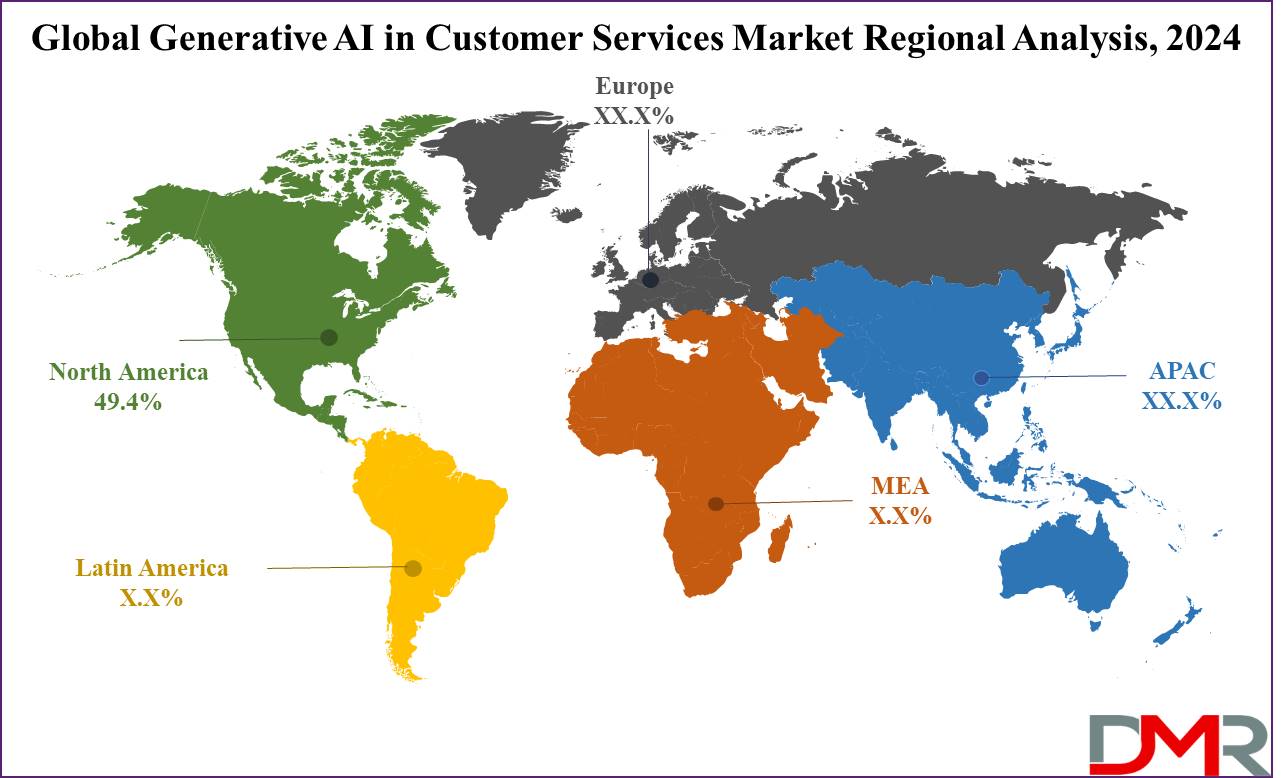
Generative AI transforms customer service by using machine learning algorithms to engage in conversations and generate responses, which automates routine tasks such as FAQ handling, enabling human agents to resolve more complex customer issues efficiently. Further,
generative AI can be trained to understand individual preferences, ensuring personalized interactions that improve customer satisfaction.
Furthermore, generative AI constantly learns and adapts, enhancing its performance and accuracy over time. By providing round-the-clock support, businesses can improve efficiency, reduce costs, and add to the overall customer experience. Customer care companies stand to benefit largely from generative AI, as it allows automation of interactions, saving both time and money while delivering on-time solutions and accurate services that support client satisfaction. As the e-commerce sector expands and online transactions grow, the need for efficient customer care solutions will continue to rise, driving higher growth in the market for generative AI in the coming years.
Key Takeaways
- Market Growth: The Generative AI in Customer Services Market size is expected to grow by 3,072.8 million, at a CAGR of 25.1% during the forecasted period of 2025 to 2033.
- By Deployment: Cloud-based is expected to lead in 2024 with a major & is anticipated to dominate throughout the forecasted period.
- By Application: Chatbot is expected to get the largest revenue share in 2024 in the Generative AI in Customer Services market.
- By End User: The retail sector is expected to lead the Generative AI in Customer Services market in 2024
- Regional Insight: North America is expected to hold a 49.4% share of revenue in the Global Generative AI in Customer Services Market in 2024.
- Use Cases: Some of the use cases of Generative AI in Customer Services are personalized recommendations, visual assistants, and more.
Use Cases
- Personalized Recommendations: Using customer data, generative AI can craft customized product or service recommendations. By looking into past purchases, browsing history, and demographic information, it can provide relevant items, improving the customer experience and boosting sales.
- Virtual Assistants: Generative AI powers virtual assistants' ability to understand and respond to natural language queries, as they can provide 24/7 support, answer FAQs, troubleshoot issues, and even perform tasks like booking appointments or placing orders, enhancing efficiency and reducing the need for human intervention.
- Content Generation: AI can develop customized content for customer interactions, like emails, chat responses, or social media messages. By understanding the context & sentiment of customer inquiries, it can build coherent and relevant responses, maintaining brand consistency and engaging customers effectively.
- Language Translation and Localization: Generative AI can support multilingual customer support by translating inquiries and responses in real-time, which breaks down language barriers, allowing businesses to meet a global customer base more effectively and ensuring smooth communication across diverse linguistic backgrounds.
Market Dynamic
Driving Factors
Businesses these days try to meet changing customer expectations by using generative AI for instant, personalized interactions, which allows complete responses, round-the-clock support, and customized recommendations, improving overall satisfaction and supporting customer loyalty. AI-driven
chatbots and virtual assistants smoothly manage high inquiry volumes, lowering costs and freeing human agents for more strategic tasks, which enhances operational efficiency, yielding both cost savings and better service quality.
Further, generative AI allows scalable customer service operations, efficiently handling growth in demand without compromising response times. Developments in AI understanding empower virtual assistants to provide customized support, contributing to more specialized customer interactions and better service standards.
Opportunities
Generative AI allows businesses to deliver personalized customer experiences efficiently by using customer data and AI algorithms. Through personalized recommendations and content, businesses improve engagement and satisfaction, driving sales growth. AI-driven chatbots and virtual assistants streamline customer support, allowing quick problem resolution through self-service options, reducing reliance on human agents, and enhancing service efficiency.
Moreover, AI supports global support by offering multilingual solutions and combining language barriers to meet diverse customer bases. Generative AI models effectively handle inquiries in many languages, allowing businesses to grow into global markets easily, as it ensures quick and accurate responses to customer queries, promoting customer satisfaction and supporting business expansion into international territories.
Restraint Factors
While
artificial intelligence (AI) constantly develops, human involvement remains important for understanding and fulfilling customers' needs effectively. Some individuals may prefer human agents for sensitive matters, causing dissatisfaction with AI-driven interactions. Also, Generative AI models may struggle with language variations and cultural nuances, having challenges for global customer service solutions. These language barriers could affect the efficiency of AI-powered support, impacting customer satisfaction negatively.
Further, Generative AI in customer service depends on data collection, building privacy concerns for consumers. To maintain trust and follow regulations, businesses must prioritize better data protection measures. Upholding customer privacy is important for supporting trust and ensuring compliance with relevant laws, safeguarding both the reputation and integrity of the business.
Trends
In the consumer services market, the latest trends in generative AI include a variety of applications. These include fraud detection, where AI systems actively identify and reduce potential fraudulent activities. Image and video generation using AI technology are gaining traction, mainly in marketing and advertising, to produce high-quality visual content. Conversational AI is also on the rise, automating routine tasks like FAQs handling, while virtual assistants streamline shopping experiences for customers.
Further, personalization remains a key focus, with generative AI allowing companies to customize customer experiences through personalized content and recommendations. In the gaming industry, generative AI is revolutionizing game development by developing realistic environments, characters, and game content, which collectively shows the growing adoption of generative AI across different sectors, driving innovation and improving customer engagement and satisfaction.
Research Scope and Analysis
By Deployment
Cloud-based deployment comes out as the leading Generative AI in the Customer Service Market for 2024, capturing the majority share, which is driven by the cloud's inherent advantages of scalability, flexibility, and smoother integration with existing customer service platforms. Businesses favor cloud-based solutions due to their ability to support advanced AI capabilities without high upfront investments in hardware or infrastructure. Access to specialized AI tools and data analytics from any location highly boosts the responsiveness and efficiency of customer service operations.
Further, the on-premise and hybrid deployments hold major importance, as they lag behind cloud adoption. On-premise solutions are primarily for organizations with strict data security and regulatory requirements, while hybrid options strike a balance between the agility of the cloud and the control of on-premise systems. However, the looking-on trend towards digital transformation, along with the affordability of cloud solutions, firmly establishes cloud-based deployment as the main model in this market, as its scalability, flexibility, and accessibility are expected to drive continued growth and innovation in generative AI for customer service.
By Application
During the forecasted period, the chatbot segment is expected to dominate the generative AI in customer services market. As a base of generative AI solutions, chatbots find a large application across healthcare, e-commerce, and telecom industries. Primarily, the travel and hospitality sector's higher adoption of chatbots is expected to drive the segment's growth, as businesses use chatbots powered by generative AI to rapidly address client inquiries. These chatbots use
natural language processing to have the contextual nuances of customer questions, ensuring precise and timely responses.
Further, the virtual assistants segment comes out as the fastest-growing category in the generative AI in the customer services market. These virtual assistants perform several tasks across many platforms and devices, often engaging in natural language conversations with customers through voice commands. By smoothly integrating with diverse services and applications, AI virtual assistants empower users to efficiently access information, manage schedules, and control smart home devices.
Further, businesses are exploring voice assistants powered by generative AI, with the ability to comprehend and respond to customer inquiries conversationally, highlighting the segment's rapid expansion and innovation potential.
By End User
The retail sector is expected to maintain its prominent position in the Generative AI in the Customer Service market in 2024. Renowned for its commitment to improving customer experiences and operational efficiency, the retail industry majorly invests in AI technologies. Generative AI solutions allow retailers to deliver on-spot assistance, personalized product recommendations, and automated responses to customer queries, thereby enhancing engagement levels and overall satisfaction.

Moreover, industries like BFSI, IT & Telecommunications, Travel & Hospitality, and Healthcare also use generative AI solutions highly. In BFSI, AI helps in delivering personalized financial advice and detecting fraudulent activities. Also, the IT & Telecom sector uses AI for technical assistance and service optimization. Further, Travel & Hospitality uses generative AI for booking assistance and customized travel suggestions. Despite the high adoption of generative AI across many sectors, the retail industry's steady focus on customer-centric strategies and its eagerness to use innovative technologies continue to highlight its dominant position within the market.
The Generative AI in Customer Services Market Report is segmented on the basis of the following:
By Deployment
- Cloud-based
- On-Premises
- Hybrid
By Application
- Chatbot
- Virtual Assistants
- Personalized Recommendations
- Sentiment Analysis
- Others
By End User
- Retail
- BFSI
- IT & Telecommunication
- Travel & Hospitality
- Healthcare
- Others
Regional Analysis
North America is expected to maintain its dominance in 2024,
holding a commanding 49.4% share in the generative AI customer services market, a trend expected to persist. The region's rapid integration of AI solutions across different industries has driven market growth. To enhance consumer satisfaction, North America exhibits a significant demand for AI-driven solutions. The increase in the number of generative chatbots, powered by AI-driven virtual assistants, is mainly notable, supported by the high presence of tech enterprises and sectors meeting to customer-centric industries.

Further, the
Asia-Pacific region is also anticipated to show substantial growth in the generative AI customer services market. Majorly, in countries like China and India, which are experiencing higher expansion in their customer service industries, driving broad adoption of AI technologies. Government initiatives further support this growth trajectory, as significant support is directed towards the adoption of AI solutions across many sectors. With significant development in generative AI for customer support, the Asia-Pacific region comes out as a leading market for AI-driven customer service solutions, expected to considerably expand in the forecast period.
By Region
North America
Europe
- Germany
- The U.K.
- France
- Italy
- Russia
- Spain
- Benelux
- Nordic
- Rest of Europe
Asia-Pacific
- China
- Japan
- South Korea
- India
- ANZ
- ASEAN
- Rest of Asia-Pacific
Latin America
- Brazil
- Mexico
- Argentina
- Colombia
- Rest of Latin America
Middle East & Africa
- Saudi Arabia
- UAE
- South Africa
- Israel
- Egypt
- Rest of MEA
Competitive Landscape
In the Generative AI in Customer Service market, players are offering a number of solutions tailored to meet the changing needs of businesses across many industries. With an aim for innovation and technology, these competitors constantly look to enhance the efficiency and effectiveness of customer service operations through generative AI. Differentiation often comes from the development of proprietary algorithms, integration capabilities, and customer-centric features, while strategic partnerships and acquisitions further shape the competitive dynamics. Even after this companies look to establish themselves as leaders by delivering advanced solutions that drive customer satisfaction and business success.
Some of the prominent players in the global Generative AI in Customer Services Market are:
- Zendesk
- Ada
- Google Dialogflow
- Freshworks
- Inbenta
- Zoho Desk Assist
- Kustomer
- Nuance
- Microsoft Azure Bot Services
- Bold360 by LogMeIn
- Other Key Players
Recent Developments
- In January 2024, Yellow.ai introduced a partnership with Infobip, a cloud communications platform, to allow enterprises with AI-powered customer assist and deliver customer experiences, as the collaboration focuses on establishing a global synergy by using combined capabilities in voice automation, CPaaS, and generative AI solutions, intending to expand market presence across Europe, India, North America, Middle East, and Asia-Pacific markets.
- In November 2023, Amazon Web Services, Inc. announced new generative AI capabilities in Amazon Connect, AWS’s cloud contact center that allows organizations of all sizes to deliver better customer experiences at lower cost. Powered by large language models (LLMs) and other foundation models (FMs) available through Amazon Bedrock, the current Amazon Connect enhancements like new generative AI capabilities expand on the service’s existing machine learning (ML) features to change how companies provide customer service. Amazon Q in Connect a generative AI-enhanced evolution of Amazon Connect Wisdom provides agents with recommended responses & actions based on real-time customer questions, for quick and better customer support.
- In October 2023, Ada introduced Ada Generative Actions, a product that uses advanced generative AI technology to resolve highly complex customer inquiries, as by this organizations can quickly build third-party integrations using plain language, without code, creating safe and reliable automated responses to customer inquiries based on multiple sources of information.
- In September 2023, Oracle unveiled the addition of generative AI-powered capabilities within Oracle Fusion Cloud Customer Experience (CX). Supported by the Oracle Cloud Infrastructure (OCI) generative AI service, the new capabilities are immersed in existing Oracle Fusion Service processes to optimize customer service delivery, enhance productivity, and help organizations improve the customer experience.
- In April 2023, Ada launched a new suite of generative AI capabilities to help companies resolve complex customer inquiries across channels instantly safely and accurately. The launch rings in a new era of automation one that uses LLMs to easily modernize customer service around voice, SMS, and messaging channels.
Report Details
| Report Characteristics |
| Market Size (2024) |
USD 490.4 Mn |
| Forecast Value (2033) |
USD 3,673.7 Mn |
| CAGR (2023-2032) |
25.1% |
| Historical Data |
2018 – 2023 |
| Forecast Data |
2024 – 2033 |
| Base Year |
2023 |
| Estimate Year |
2024 |
| Report Coverage |
Market Revenue Estimation, Market Dynamics, Competitive Landscape, Growth Factors and etc. |
| Segments Covered |
By Deployment (Cloud-based, On-Premises, and Hybrid), By Application (Chatbot, Virtual Assistants, Personalized Recommendations, Sentiment Analysis, and Others), By End User (Retail, BFSI, IT & Telecommunication, Travel & Hospitality, Healthcare, and Others) |
| Regional Coverage |
North America – The US and Canada; Europe – Germany, The UK, France, Russia, Spain, Italy, Benelux, Nordic, & Rest of Europe; Asia- Pacific– China, Japan, South Korea, India, ANZ, ASEAN, Rest of APAC; Latin America – Brazil, Mexico, Argentina, Colombia, Rest of Latin America; Middle East & Africa – Saudi Arabia, UAE, South Africa, Turkey, Egypt, Israel, & Rest of MEA
|
| Prominent Players |
Zendesk, Ada, Google Dialogflow, Freshworks, Inbenta, Zoho Desk Assist, Kustomer, Nuance, Microsoft Azure Bot Services, Bold360 by LogMeIn, and Other Key Players |
| Purchase Options |
We have three licenses to opt for: Single User License (Limited to 1 user), Multi-User License (Up to 5 Users), and Corporate Use License (Unlimited User) along with free report customization equivalent to 0 analyst working days, 3 analysts working days and 5 analysts working days respectively. |